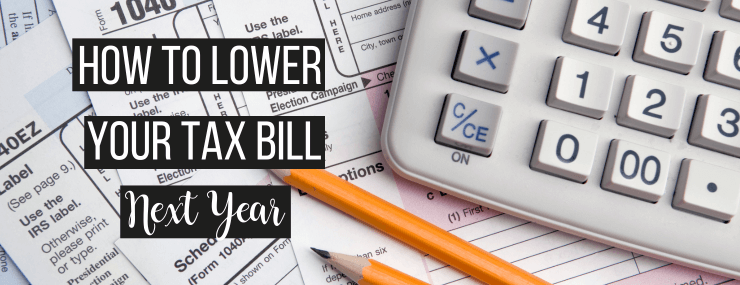
If you were surprised at tax time this year, then you’re not alone. 2022 tax refunds were about 10 percent smaller than they were last year, and for those who owed money, they tended to owe more than they expected.
The good news is, there’s still time to plan out how to lower your tax bill for next year – or at least feel more aware of what you will owe or receive. Taking the time now to make some strategic moves can lead to some significant savings on your taxes for the year.
Increase Retirement Savings to Lower Your Tax Bill
One of the simplest ways to cut down on your tax liability is to save for retirement. Whether you’re contributing to a pre-tax 401(k), 403(b) or a traditional IRA, those savings will help to decrease your taxable income.
So if you aren’t expecting to max out your retirement account this year, try funneling a little bit more money into those accounts to see savings at tax time.
Here are a few more posts about maximizing your retirement savings:
You Maxed out Your 401(k) – What Should You Do Next?
Are Your 401(k) Savings Enough?
Six Financial Planning Moves for Your 40s
Contribute to an HSA or FSA
Health savings accounts (HSAs) and flexible spending accounts (FSAs) are another great way to save money on your tax bill each year.
HSAs are tax deductible, meaning whatever you contribute can lower your taxable income. FSAs, on the other hand, are funded with pre-tax dollars, meaning you won’t have to pay taxes on that money if it’s used for applicable expenses.
Understand Your Tax Liabilities
One of the biggest issues that come up at tax time is people getting caught off guard because they didn’t know what they owe. Make sure you’re withholding enough throughout the year to avoid a larger than expected tax bill.
If you’re a business owner, honor your tax liabilities, and keep up with estimated tax payments each quarter. That will help prevent any expensive surprises at tax time.
Consider Tax Loss Harvesting
If you have any losses in your investment accounts, you could sell the ones worth less than what you bought them for. This will help offset capital gains from other investments. This process is called tax loss harvesting, and it can lead to savings on your tax bill.
You can also typically write off an additional $3,000 a year in capital losses against your income. Additional losses also roll over to future years.
If you go this route, just make sure you don’t re-purchase the same investment thirty days before or after the sale. If you do, you could trigger wash sale rules.
Look into Energy Savings
If you make your home or your vehicle more energy efficient, you may be eligible for certain tax credits.
One option is the Inflation Reduction Act (IRA), which can give you a credit of up to $3,200 when you make energy efficient home improvements. Some of those improvements include heat pumps, heat pump water heaters, insulation and electric panel upgrades. You can see the full list of improvements here.
Additionally, if you purchase a new plug-in electric vehicle (EV) or fuel cell vehicle (FCV) during or after 2023, you may qualify for the clean vehicle tax credit. This credit is up to $7,500, and is set to expire in 2032 unless renewed.
This credit is available for both individuals and their businesses.
There are some qualifications, including:
- You must use the vehicle for your own use;
- Your adjusted gross income must not exceed $300,000 for married couples filing jointly, $225,000 for heads of households, or $150,000 for all other filers. (You can use your modified AGI from the year you purchase the vehicle or the year before, whichever is less;)
- You must purchase the vehicle new;
- The vehicle must be made by a qualified manufacturer;
- The vehicle’s suggested retail price (MSRP) cannot exceed $80,000 for vans, sport utility vehicles and pickup trucks, or $55,000 for other vehicles. For example, a Tesla Model 3 would technically apply for this credit right now, but a Tesla Model S or Model X would not. (due to the vehicle’s MSRP.)
You can also check if your state has any incentives for energy-saving or climate friendly updates.
About Your Richest Life
At Your Richest Life, physician-focused financial planner Katie Brewer, CFP®, wants to help you build a successful financial future. For more information on the services offered, contact Katie today.
The post How to Lower Your Tax Bill Next Year appeared first on Your Richest Life.




